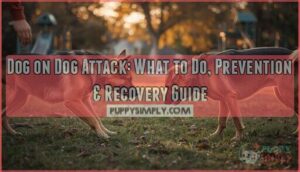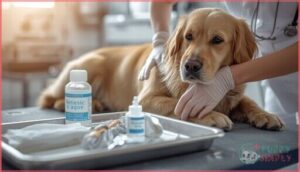This site is supported by our readers. We may earn a commission, at no cost to you, if you purchase through links.

A dog fight can erupt in seconds—teeth bared, bodies colliding, and owners frozen in panic, unsure whether to intervene or how to stop the violence without getting hurt themselves. Emergency veterinary clinics across the country report that dog-on-dog attacks account for a significant portion of trauma cases, with injuries ranging from superficial punctures to life-threatening wounds requiring surgical repair.
Yet most incidents don’t happen because dogs are inherently vicious; they occur when warning signs go unnoticed, when environments aren’t managed properly, or when medical conditions silently erode a dog’s tolerance for social interaction.
Understanding what triggers these attacks, how to recognize the subtle shifts in body language that precede them, and which intervention strategies actually work can mean the difference between a tense moment that de-escalates safely and an encounter that ends in injury, expensive veterinary bills, and lasting behavioral damage to both animals involved.
Table Of Contents
- Key Takeaways
- What is a Dog-on-Dog Attack?
- Causes and Risk Factors for Dog Attacks
- Immediate Actions During and After an Attack
- Preventing Dog-on-Dog Attacks
- Legal, Community, and Veterinary Support
- Frequently Asked Questions (FAQs)
- What are the consequences if an owner does not obey leash laws?
- Is there a way to tell if a dog is aggressive before it attacks?
- Can I receive any financial assistance for my dog’s medical bills?
- Can my dog develop PTSD after an attack?
- What insurance covers dog attack liability and costs?
- How do I help my dog trust others again?
- Are certain parks or areas more attack-prone?
- Should I carry deterrent spray during dog walks?
- Conclusion
Key Takeaways
- Most dog-on-dog attacks don’t stem from inherent viciousness but from unnoticed warning signs, improper environment management, or underlying medical conditions that erode a dog’s social tolerance.
- Before an attack escalates, you’ll see clear body language shifts—stiff posture, raised hackles, hard stares, bared teeth, or freeze-then-lunge sequences—that give you critical seconds to intervene and prevent injury.
- Prevention requires multiple layers: enforcing leash laws, providing early socialization under professional guidance, managing high-risk dogs through environmental modifications like safe zones and barriers, and addressing medical triggers through veterinary assessment.
- After an attack, your responsibilities extend beyond emergency care to include filing incident reports with animal control within 24-72 hours, securing veterinary follow-up to rule out pain or hormonal issues, and committing to long-term behavioral rehabilitation that rebuilds both dogs’ confidence.
What is a Dog-on-Dog Attack?
A dog-on-dog attack occurs when one dog physically assaults another, resulting in injuries that range from superficial wounds to life-threatening trauma. These incidents don’t always look the same—some involve prolonged fighting, while others consist of a single bite or a brief scuffle that escalates quickly.
Understanding what defines an attack, where these encounters usually happen, and how to spot the warning signs before things turn serious can help you protect your dog and respond effectively when conflict arises.
Definition and Types of Dog-on-Dog Aggression
Dog-on-dog aggression means any intentional behavior aimed at harming another dog—bites, lunges, or targeted snapping. You’ll see different types: redirected aggression when your dog lashes out at another after being startled, territorial defenses at home, social dominance battles over pack hierarchy, and even play that escalates into real biting. One common trigger is resource guarding, particularly how to stop food aggression when dogs feel their meals or treats are threatened by another animal.
Understanding these canine behavior patterns helps you recognize what’s actually happening during dog fighting incidents. Researchers use methodological rigor to assess study summaries and improve the accuracy of their findings.
Common Scenarios Where Attacks Occur
You’ll most often see dog fights erupt during resource guarding—when two dogs compete over food, toys, or even your attention. Territorial disputes flare up in yards or at doorways, while off-leash encounters can quickly spiral from friendly sniffing into canine aggression.
Pack dynamics matter too: dominance challenges in multi-dog homes frequently trigger animal attacks, especially during introductions without proper supervision. Understanding underlying behavioral issues—like why dogs develop compulsive behaviors—can help owners identify stress signals before conflicts escalate.
Recognizing Early Warning Signs
Before a full dog attack unfolds, you’ll notice canine body language shifts—stiff posture, raised hackles, or a hard stare directed at another dog. Watch for bared teeth, low growling, or freeze-then-lunge sequences that signal aggression triggers. If you have young kids at home, choosing breeds with calm, predictable temperaments reduces the risk of misreading those warning signs during playtime.
Recognizing these warning signs early lets you intervene before animal behavior escalates, making attack prevention possible through spatial separation or controlled redirection.
Causes and Risk Factors for Dog Attacks
Understanding why dog-on-dog attacks happen starts with recognizing that aggression rarely appears out of nowhere. Medical conditions, hormonal shifts, and even a dog’s physical makeup can all play a role in how they react under stress.
Dog aggression rarely appears without cause—medical conditions, hormones, and physical traits all shape how dogs react under stress
Let’s break down the key factors that increase risk and set the stage for conflict.
Medical and Behavioral Triggers
Understanding what drives canine aggression starts with looking beneath the surface. Pain management becomes critical when chronic discomfort from orthopedic issues or acute illness heightens your dog’s reactivity during social encounters. Hormonal influences, neurological disorders, and fear-based triggers can all escalate dog behavior unexpectedly, making veterinary intervention and behavioral modification essential for dog safety and animal welfare. When accidents happen during grooming sessions, knowing how to stop bleeding from a dog’s nail quickly and safely can prevent minor injuries from escalating into stressful situations for both you and your pet.
- Chronic pain reduces tolerance and amplifies aggressive responses toward other dogs
- Medical conditions like cognitive dysfunction alter social behavior and increase canine aggression risk
- Fear from poor socialization creates defensive reactions that precipitate dog attacks
Breed, Size, and Hormonal Influences
Your dog’s genetics, body size, and hormonal status shape aggression patterns in ways you can’t ignore. Large breeds exert greater bite forces and display different social thresholds than smaller dogs, while intact males show elevated canine aggression risks in many studies.
Neuter effects vary by individual history, yet seasonal hormonal fluctuations can spike irritability. Recognizing these breed traits and size factors helps you anticipate dog behavior and prioritize dog safety and animal welfare.
Immediate Actions During and After an Attack
When a dog fight erupts, your first priority is protecting yourself and stopping the attack as safely as possible. The seconds immediately after the dogs separate are critical—you need to assess injuries quickly and decide whether your dog needs emergency care.
Here’s what to do when aggression turns physical, from breaking up the fight to getting your dog the right treatment.
Safe Intervention and Self-Protection
When a dog attack erupts, your instincts might tell you to grab the animals—but that’s when self-defense matters most. Follow these safety protocols:
- Use loud commands and diversions (water spray, barrier, noise) to interrupt aggression from a safe distance
- Create a physical barrier between yourself and the dogs without direct contact
- Move away slowly—never turn your back to avoid redirected bites
- Call animal control immediately for emergency response and professional deescalation techniques
Assessing and Treating Dog Bite Injuries
After securing the scene, carefully inspect each dog bite for depth and location.
Clean the wound with lukewarm water and soap for at least five minutes, then apply gentle pressure with clean gauze to control bleeding. Don’t probe deep punctures or remove embedded debris—that’s a job for your veterinarian.
Document wound size, location, and severity through photos to guide professional veterinary care decisions.
When to Seek Emergency Veterinary Care
Uncontrolled bleeding signals you’ve crossed into emergency territory—when gauze pressure won’t stop the flow after a few minutes, immediate veterinary care becomes non-negotiable.
Watch for these critical emergency signs requiring urgent shock treatment:
- Pale gums, rapid breathing, or collapse indicating your dog can’t maintain circulation
- Deep puncture wounds or gaping bite wounds on the face, neck, or hands
- Severe swelling, seizures, vomiting, or suspected toxic exposure from the attack
Veterinary medicine offers the best chance for injured animals when you act quickly.
Preventing Dog-on-Dog Attacks
Prevention works best when you address the problem before it starts. The strategies below focus on managing your dog’s environment, improving social skills, and recognizing when extra caution is necessary.
Each approach reduces risk by targeting the specific factors that lead to conflict between dogs.
Leash Laws and Responsible Ownership
You mightn’t realize it, but leash law enforcement in public spaces isn’t just about compliance—it’s your first line of defense against dog-on-dog attacks. Every state mandates leash control, usually six feet or less, to prevent incidents.
Responsible dog ownership means securing pet license requirements, maintaining current vaccinations, and understanding dog owner liability. Animal control measures exist to protect everyone, so proper public space etiquette and adherence to leash law standards directly impact dog safety and community well-being.
Proper Socialization and Training
Think of proper socialization as the foundation of your dog’s self-protection skills. Early exposure to varied canine interactions under a Certified Dog Trainer reduces fear-based reactivity by 40–60%.
Daily obedience skills—recall, sit, leave-it—give you control when tension rises.
Behavioral modification through desensitization and counterconditioning teaches canine communication basics, reinforcing dog owner responsibility and preventing conflicts before they escalate.
Management Strategies for High-Risk Dogs
If your dog’s already shown aggression, you need a different playbook. Start with a veterinary Risk Assessment to rule out pain or medical triggers, then build a Behavior Modification plan with a certified trainer.
Track every Incident Reporting detail, enforce strict leash and muzzle protocols, and commit to ongoing Owner Education.
Canine Rehabilitation demands consistency, vigilance, and professional support—your dog’s future depends on it.
Environmental Modifications and Supervision
Beyond training alone, your physical space matters just as much. Set up Safe Zones with Barrier Use—baby gates, closed doors—so dogs can retreat during stress. Maintain tight Supervision Ratios, remove triggers like toys or food bowls, and always provide Escape Routes.
These environmental modifications turn your home into a dog attack prevention zone, reinforcing every layer of animal safety and pet safety you’ve built.
Legal, Community, and Veterinary Support
After an attack, your response doesn’t end with emergency care—it extends into legal responsibilities, community safety protocols, and ongoing behavioral support. Reporting the incident properly, working with animal control, and following through with veterinary rehabilitation can prevent future attacks and protect both dogs and people.
Here’s what you need to know about the systems in place to help you navigate the aftermath and work toward long-term solutions.
Reporting and Investigating Dog Attacks
After a dog attack, you must file an incident report with local animal control within 24 to 72 hours. Authorities will conduct a police investigation, collecting evidence—witness statements, photos, veterinary records—to determine liability assessment and guarantee regulatory compliance.
Public safety teams coordinate to assess rabies risk and manage containment failures. This use of force documentation protects everyone involved.
Animal Control and Public Safety Measures
Once the investigation is complete, animal control enforces leash laws, bite reporting protocols, and animal regulations to protect public safety. They assess dangerous dog designations, monitor compliance with confinement orders, and coordinate emergency response when attacks occur.
Many jurisdictions also require liability insurance for high-risk dogs. These use of force policies and dog attack prevention measures help prevent future incidents in your community.
Veterinary Follow-Up and Behavioral Rehabilitation
Recovery starts with your veterinarian ruling out pain, hormonal imbalances, or neurological issues that fuel aggression. You’ll work through a tailored behavioral therapy plan—desensitization and counterconditioning—while tracking progress with standardized scoring tools.
Your household needs a written safety protocol detailing supervision routines and equipment use. Structured follow-up visits guarantee your rehabilitation plans adapt as your dog heals, protecting both pet safety and wellbeing.
Community Education and Prevention Programs
Schools and public workshops teach you to spot warning signs and respond safely when dog-on-dog aggression unfolds. Community outreach through prevention strategies—licensing, vaccination, leash laws—reduces incident reports while improving animal welfare.
Joint training provides shelter staff with de-escalation techniques. Scenario-based programs, funded by municipal grants and nonprofits, strengthen public awareness of animal safety, ensuring pet safety and wellbeing through hands-on demonstrations and responsible ownership education.
Frequently Asked Questions (FAQs)
What are the consequences if an owner does not obey leash laws?
You’d think a simple leash would be easy to manage, yet leash violations trigger civil penalties, escalating fines, animal control seizures, owner liability for injuries, and even court-mandated training—all affecting public safety and your dog’s future.
Is there a way to tell if a dog is aggressive before it attacks?
Yes—watch for stiff posture, direct stares, bared teeth, raised hackles, and a high, rigid tail.
These canine body language signals often precede dog attacks, giving you critical seconds to create distance and prevent aggressive dog behavior.
Can I receive any financial assistance for my dog’s medical bills?
When bills bite harder than the injury itself, you’re not alone. Pet insurance, veterinary grants, crowdfunding options like GoFundMe, and medical loans can help cover costs, while some clinics offer payment plans for injured animals.
Can my dog develop PTSD after an attack?
Your dog can develop trauma symptoms after an animal attack, including persistent fear, withdrawal, and heightened arousal.
PTSD symptoms may require behavioral therapy, stress management, and veterinary-directed canine anxiety treatment for trauma recovery.
What insurance covers dog attack liability and costs?
When bite happens, you’re not barking up the wrong tree—homeowners or renters liability insurance usually covers dog attack incidents, including medical expenses and legal defense costs, up to your policy limits and exclusions.
How do I help my dog trust others again?
Fear rehabilitation starts with gradual, controlled exposure to calm dogs at a distance your pet tolerates. Pair each encounter with high-value treats, building positive associations through consistent behavioral modification and patient socialization techniques over weeks to months.
Are certain parks or areas more attack-prone?
Yes. Public parks with high dog density, limited space, and low leash compliance show elevated incident rates.
Urban planning, spatial analysis, and attack hotspots reveal that park safety depends on supervision, design, and community response to animal attacks.
Should I carry deterrent spray during dog walks?
You may carry deterrent spray as a precautionary self-protection tool during walks, though effectiveness varies.
Prioritize canine defense through proper dog training, leash control, and walk precautions over relying solely on personal protection devices against aggressive dog encounters.
Conclusion
Can you predict the exact moment tension will escalate, or will you rely on preparation to keep your dog safe? Every dog-on-dog attack leaves lasting consequences—physical wounds heal faster than behavioral scars.
Your responsibility extends beyond managing the crisis itself; it includes recognizing warning signs early, intervening strategically when conflict erupts, and committing to long-term rehabilitation that rebuilds confidence and trust.
Prevention isn’t luck—it’s deliberate, informed action repeated daily.












